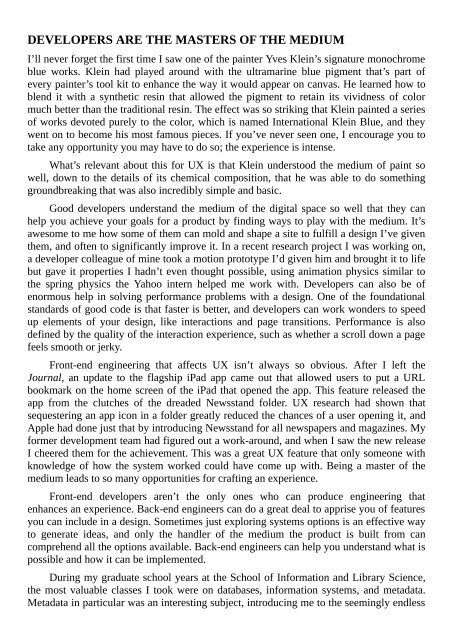You also want an ePaper? Increase the reach of your titles
YUMPU automatically turns print PDFs into web optimized ePapers that Google loves.
DEVELOPERS ARE THE MASTERS OF THE MEDIUM<br />
I’ll never forget the first time I saw one of the painter Yves Klein’s signature monochrome<br />
blue works. Klein had played around with the ultramarine blue pigment that’s part of<br />
every painter’s tool kit to enhance the way it would appear on canvas. He learned how to<br />
blend it with a synthetic resin that allowed the pigment to retain its vividness of color<br />
much better than the traditional resin. The effect was so striking that Klein painted a series<br />
of works devoted purely to the color, which is named International Klein Blue, and they<br />
went on to become his most famous pieces. If you’ve never seen one, I encourage you to<br />
take any opportunity you may have to do so; the experience is intense.<br />
What’s relevant about this for UX is that Klein understood the medium of paint so<br />
well, down to the details of its chemical composition, that he was able to do something<br />
groundbreaking that was also incredibly simple and basic.<br />
Good developers understand the medium of the digital space so well that they can<br />
help you achieve your goals for a product by finding ways to play with the medium. It’s<br />
awesome to me how some of them can mold and shape a site to fulfill a design I’ve given<br />
them, and often to significantly improve it. In a recent research project I was working on,<br />
a developer colleague of mine took a motion prototype I’d given him and brought it to life<br />
but gave it properties I hadn’t even thought possible, using animation physics similar to<br />
the spring physics the Yahoo intern helped me work with. Developers can also be of<br />
enormous help in solving performance problems with a design. One of the foundational<br />
standards of good code is that faster is better, and developers can work wonders to speed<br />
up elements of your design, like interactions and page transitions. Performance is also<br />
defined by the quality of the interaction experience, such as whether a scroll down a page<br />
feels smooth or jerky.<br />
Front-end engineering that affects UX isn’t always so obvious. After I left the<br />
Journal, an update to the flagship iPad app came out that allowed users to put a URL<br />
bookmark on the home screen of the iPad that opened the app. This feature released the<br />
app from the clutches of the dreaded Newsstand folder. UX research had shown that<br />
sequestering an app icon in a folder greatly reduced the chances of a user opening it, and<br />
Apple had done just that by introducing Newsstand for all newspapers and magazines. My<br />
former development team had figured out a work-around, and when I saw the new release<br />
I cheered them for the achievement. This was a great UX feature that only someone with<br />
knowledge of how the system worked could have come up with. Being a master of the<br />
medium leads to so many opportunities for crafting an experience.<br />
Front-end developers aren’t the only ones who can produce engineering that<br />
enhances an experience. Back-end engineers can do a great deal to apprise you of features<br />
you can include in a design. Sometimes just exploring systems options is an effective way<br />
to generate ideas, and only the handler of the medium the product is built from can<br />
comprehend all the options available. Back-end engineers can help you understand what is<br />
possible and how it can be implemented.<br />
During my graduate school years at the School of Information and Library Science,<br />
the most valuable classes I took were on databases, information systems, and metadata.<br />
Metadata in particular was an interesting subject, introducing me to the seemingly endless


